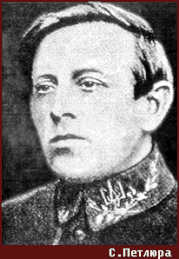 Ukrainian director Oles Yanchuk’s latest film, Secret Diary of Symon Petliura, was released earlier this year. I believe it released only in Ukrainian, but am hoping a version with English subtitles will become available. Yanchuk is known for making films that are both historical and political. His other works treat subjects such as the 1930s famine in Ukraine – widely regarded as a preventable disaster forced on the region by the Soviet dictator Joseph Stalin – in his 1991 film Famine 33; while his 1995 work Assassination deals with the killing of Ukraine’s wartime nationalist leader Stepan Bandera in 1959. All his films address subjects that were off limits during the Soviet era and have often spawned controversy. The latest is no different. Posters for the film displayed outside a cinema in Zaporizhia were splattered with red paint in September, and leaflets distributed with the words “Petliura – Persecutor of Jewish People”. Petliura led the Ukrainian National Republic during Ukraine's short-lived sovereignty in 1918–1921, and was commander of the Ukrainian Army, leading the struggle for independence following the fall of the Russian Empire in 1917. Secret Diary of Symon Petliura is based on entries in a fictional diary featuring key events leading up to Petliura’s exile in France from 1924. It also features a number of clips in black and white that were filmed in Ukraine in 1919. The main event of the film is the trial of Sholem Schwartzbard, a Jewish watchmaker who assassinated Petliura in Paris in 1926 because of his involvement in anti-Semitic pogroms at the time of the Russian Civil War in 1918-21. The accused was pronounced not guilty on the basis of Petliura’s role in respect of the attacks on Jews. Much later, in the 1950s, a KGB agent who had defected to the US claimed that Schwartzbard had been an agent of the Soviet secret police, the NKVD – a precursor to the KGB. Petliura is still a controversial figure. For Ukrainians he is a national martyr who fought against Poles, Bolsheviks, Russia’s White Army and Anarchists during the mayhem that constituted the Civil War in Ukraine. For Jews, he was the Ukrainian leader, whose army committed terrible anti-Semitic violence. It is widely understood that Petliura himself was not an anti-Semite. Indeed he signed an order dated August 1919 that “All those who will be inciting you to carry out pogroms be expelled from our army and tried as traitors of the Motherland”. But he manifestly failed to prevent his troops from carrying out pogroms and appeared to have pulled back from his threats to punish officers and soldiers engaged in crimes against the Jews for fear of losing their support. This account of Petliura, published in the Yiddish language Der Morgen Zshurnal in 1926, gives a glimpse of the commonly held view. “In the primitive Jewish folk consciousness a very definite idea of the just recently assassinated Petliura has formed. Under this name the people imagine a terrible, wild rider on a white horse, with blood-filled eyes, a thick Cossack moustache and an unhuman cruel face, who rides into a Jewish village at the head of bloodied pogromchiks and slaughters every Jew that comes in his way with animal delight”. And here’s how I described Petliura’s army in my book A Forgotten Land: “A rogue by the name of Petliura had been released from prison and was regrouping the Ukrainian nationalists. One of his first actions was to order railway stations to be attacked so that he could grab the weapons of the evacuating German soldiers, which were more sophisticated and in better condition that then guns and grenades that his own men had stowed away in chicken sheds and stables across the land. He and his banda didn’t only steal weaponry, they took clothes, money, munitions, trucks, carts and horses, anything that would help them seize Kiev and the government of the land for themselves. “Thieving was a way of life to them and in the towns and villages Petliura’s men passed through they stole first and foremost from the Jews. All across the land, the experience was the same. They didn’t knock at the door, but hammered and kicked, giving an indication of what to expect. Once I was alone in my father’s cottage when the Petliurists came. I hid in the wardrobe upstairs rather than answer the door, my heart pounding. First they tried kicking it down, then they shot bullets at the hinges so that the door collapsed. They walked in and dropped cigarettes on the floor, grinding the stubs with the heel of their boots, crushing shreds of paper and tobacco into the earth floor that I spent hours sweeping and watering so that it looked like polished tiles. Seeing that there was nothing for them, they soon walked out, and I could hear them hammering on the neighbours’ doors, shooting other people’s door hinges and shouting ‘You filthy yids!’ as they pushed occupants aside and took all they could find: food, clothing, silver and especially money.”
0 Comments
|
Keeping stories aliveThis blog aims to discuss historical events relating to the Jewish communities of Ukraine, and of Eastern Europe more widely. As a storyteller, I hope to keep alive stories of the past and remember those who told or experienced them. Like so many others, I am deeply troubled by the war in Ukraine and for the foreseeable future, most articles published here will focus on the war, with an emphasis on parallels with other tumultuous periods in Ukraine's tragic history. Archives
March 2024
Categories
All
|
 RSS Feed
RSS Feed
